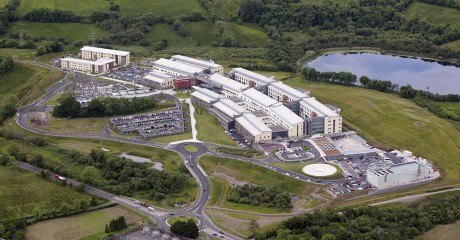
South West Acute Hospital, Enniskillen
DWINDLING numbers of nurses and health service staff are having a major impact on rising costs as hospitals are forced to use locum staff, a leading health care official has said.
Some departments in the Western Health Trust face up to 48 per cent vacancy rate in permanent posts and local hospitals often have to use agency staff to plug staff shortages.
It was also revealed at the Patient and Client Council meeting that almost 300 extra nursing staff is needed at the South West Acute Hospital (SWAH) than compared to the old Erne Hospital.
However, Joe Lusby, who is the deputy chief executive of the Western Health and Social Care Trust (WHSCT), stated that the trust has not secured recurrent funding for these additional nurses.
“There is difficulty in Accident & Emergency unit staffing and, like many others areas, it is the middle tier of staffing,” he added.
“As a result of this we have to use locum staff.
“Staffing levels contribute to our yearly spend and these additional costs are a worry for us.
“Since the start of new SWAH programme, there’s been an increase in quantity and calibre of applicants for consultant positions and across Fermanagh and Omagh, the WHSCT have 62 funded consultant posts, of which eight are vacant, with two in radiology and two in geriatric medicine.
“There is a national shortage of radiologists. There are 86 middle grades in the southern sector and out of the permanent posts, there are 48% vacancy which is impacting on our spending.”
It was also revealed that £9m is being spent on a process which will identify what a minimum staffing level is.
During last Thursday’s meeting, which was chaired by Louise Skelly (head of operations, Patient and Client Council), it was announced that cardiac MRI is due to start in Enniskillen.
Previously, patients would have had to travel to the Mater Hospital in Belfast for this service.
According to Mr Lusby, around 300 outpatients use the SWAH every week with a “raft of visiting consultants” running the clinics meaning patients do not have to travel.
The crowd attending the public meeting were told that the panel, made of up leading health officials, would be “honest and open”. Questions were then put forward from health service users as well as carers.
These covered a number of areas including staff training where the panel admitted to not knowing the number of people who are currently training.
Other issues covering the care of elderly people in the community and at the A&E unit were raised. One local resident asked the panel: “Why are drunk and disorderly people always dealt with before elderly people?”
The audience heard that a patient pathway was designed for elderly people which aims to attend to them as “quickly as possible”, however the answer didn’t appear to assure the concerned patient.
Dean Sullivan, director of commissioning for the trust, added: “Patients who attend A&E in a drunk state are putting a big strain on staff and that the trust is actively pursuing the growing issue.”
In response to the Western Trust’s plans to deal with the looming cuts, Mr Lusby stated: “We (Western Trust) have rationalised our hospital estate while other trusts haven’t.”








